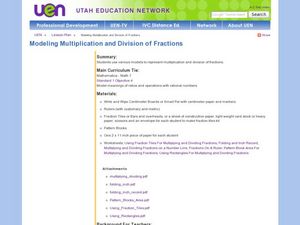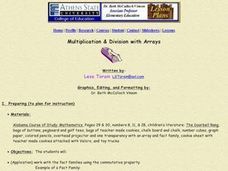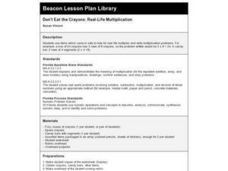Curated OER
Modeling Multiplication and Division of Fractions
Create models to demonstrate multiplication and division of fractions. Using fraction tiles to model fractions, pupils explore fractions on a ruler and use pattern blocks to multiply and divide. They also create number lines with fractions.
Curated OER
Relating Multiplication and Division
Help the class determine missing factors in equations by creating arrays. Through modeling and practice, they come to see the inverse relationship between multiplication and division. As an assessment, individuals build their own array...
Curated OER
Division by Fractions (Part Two)
Investigate division through the use of array models. The lesson focuses on using area models to compare division as sharing with division as grouping. Students evaluate the usefulness and limitations of the two array models.
Curated OER
Division by Fractions (Part One)
Learners demonstrate array models to illustrate division as sharing and grouping. They demonstrate the array models to compare division as sharing with division as grouping. Pupils explore division problems are typically seen as either...
Curated OER
Multiplication & Division with Arrays
Third graders work with fact families using the commutative property, arrange arrays with manipulatives, and multiply and divide symbolically with numbers.
Curated OER
Multiplication: Bugs Can Multiply, So Can I!
Develop multiplication skills with your class. Youngsters will visualize multiplication as repeated addition. Then they will create a multiplication bug book and discover arrays as a strategy for multiplication problem solving....
Delaware Math Cadre Elementary Committee
Operations and Algebraic Thinking
How to use the relationship between multiplication and division to solve math word problems is the focus of the instructional activity presented here. In it, fourth graders work in groups to solve problems posed by the teacher. Then,...
Curated OER
Relating Multiplication and Division
Students use counters to review arrays and multiplication and learn arrays and division. In this multiplication and division lesson, students use counters to arrange multiplication equations and division equations.
Scholastic
Study Jams! Multiplication
What does baking cupcakes have to do with multiplication? Watch this video and find out as your class learns that multiplication is the repeated addition of equal groups. Properties of multiplication are also introduced with...
Curated OER
One Hundred Hungry Ants (Multiplication and Division)
Fourth graders explore factors of numbers from 1 to 50. They gain practice with basic facts and multi-digit multiplication problems. Students practice the commutative property. They discover the link between multiplication and...
Curated OER
Multiplication and Division with Arrays
Students practice the commutative property, create and manipulate arrays and multiply and divide numbers.
Curated OER
Handcarts - A Unique Form of Transportation
An interesting historical fact about how handcarts benefitted to the Mormon pioneers is the context behind this math lesson. Using given facts and figures regarding the handcart, pupil pairs create math word problems, share them with the...
Pennsylvania Department of Education
Multiplication Represented as Arrays
Third graders collect data about themselves and use in a line plot. In this analyzing data lesson, 3rd graders collect various sets of information,create a line plot and compare the data. Students complete a worksheet on their...
Illustrative Mathematics
Comparing Products
How can 5th graders show understanding that 30 x 225 is half of 60 x 225 without completing the computation? They can use an area model and draw it out. An array, or an open array, is an area model that allows for young learners to...
Curated OER
Positive and Negative Numbers
Pupils use blocks and markers to illustrate the processes of adding, subtracting, multiplying and dividing integers. In this mathematics lesson, learners use Algebra blocks to demonstrate multiplying polynomials.
Curated OER
Prime and Composite Numbers
Fifth graders use prime factorization to identify prime and composite numbers. They use cubes to find factors. In groups, 5th graders draw rectangular arrays to discover prime numbers under 100.
Curated OER
Don't Eat the Crayons: Real-Life Multiplication
Third graders use items which come in sets to look for real-life multiples and write multiplication problems. This lesson assess the student's understanding of the meaning of multiplication using an array model and manipulatives.
Curated OER
Who's In The Fact Family?
Students study related addition and subtraction facts. In this math lesson, students use related addition and subtraction to solve problems. Students use manipulatives to explore fact families.
Curated OER
Making Rectangles
Learners study rectangles. In this math instructional activity, students use numbers, measurements and geometry to draw rectangles of varying sizes.
Curated OER
Solving Problems
Second graders become familiar with need strategies for computation of money problems and estimating sums. In this computation lesson plan, 2nd graders solve real life problems to understand estimation and money problems.
Pennsylvania Department of Education
Freckle Face
Students collect and record data. In this early data analysis lesson, students gather data about their partners face. As a class, the students use tally marks and pictographs to record the data and answer question about the information...
Curated OER
Prime Numbers and Factors
Students determine factors of numbers to 100 and identify prime factors; students differentiate prime and composite numbers by the factors of the numbers.
Curated OER
Finding Sums to 6
Learners explore the additive identity property where they add multiple numbers to get to the number 6. In this number 6 lesson plan, students also work on their addition charts.
Curated OER
Finding Addition Patterns
Students practice finding the sums of two-one digit numbers. In this addition lesson plan, students also record facts onto an addition chart.























